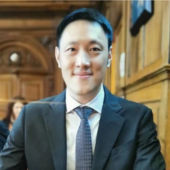Author: [AUTHOR] Published on 3/1/2024 12:00:00 AM
Xuyang Song, MBA, PhD, Executive Director, Head of Clinical Pharmacology, Adlai Nortye, North Potomac, Maryland
What excites you about serving in your role as Early Development & Drug Safety community chair?
I am thrilled to serve as the Early Development & Drug Safety (EDDS) Community Chair for several compelling reasons. With a deep passion for our ASCPT community, I see incredible potential for growth and impact in this role. It provides a unique opportunity to actively contribute to our Community's development and foster connections among our diverse members, including clinical researchers, US Food and Drug Administration (FDA) reviewers, consultants, industry professionals, and investors.
What excites me the most is the chance to connect and collaborate with fellow scientists who share our passion. We are organizing a series of virtual events, including webinars, panel discussions, and networking opportunities, to facilitate this collaboration. Additionally, we have established a platform dedicated to early career scientists, offering them the opportunity to engage with seasoned experts and receive valuable career development advice. Our primary focus is on creating a culture of continuous learning and supporting the growth of early career scientists.
Beyond the Community's benefits, this role offers personal growth and learning opportunities, supported by the ASCPT team. Embracing leadership and organizational challenges, I look forward to broadening my horizons and leaving a lasting impact on drug development.
In summary, serving as the EDDS Community Chair allows me to give back to a community that has enriched my professional journey. It provides a platform to collaborate with exceptional individuals and shape our collective future.
What professional accomplishment are you most proud of?
I take great pride in one of my most significant professional accomplishments, which centers on my pivotal role in the development and approval of Durvalumab, marketed as IMFINZI, and Tremelimumab, marketed as Imiudo, in various countries. These groundbreaking immunotherapies hold the promise of making a substantial positive impact on patient outcomes.
My involvement in these two drug development initiatives spans over 8 years, encompassing phases from phase I trials through drug approval and subsequent lifecycle management. It began with my support of one study as a PK scientist and later evolved into a leading role in clinical pharmacology overseeing over 70 clinical trials in a diverse range of indications with multiple successful global filings. The entailed close collaboration with cross-functional leaders and active engagement with regulatory agencies, such as the FDA, the European Medicines Agency (EMA), the Pharmaceuticals and Medical Devices Agency (PMDA), and more. These interactions played a pivotal role in securing approvals and provided me with invaluable experience in global submission and development strategy.
On of the highlights of this journey is my contribution to the creation of a novel dose and schedule combination for PDL1 and CTLA4 treatment (IMFINZI + Imjudo). I played a pivotal role in devising this innovative approach, which involved incorporating a single priming dose of Imjudo with IMFINZI in the treatment of liver cancer. This work has recently been published in Clinical Cancer Research (Clin Cancer Res CCR-22-1983).
I would like to take this opportunity to extend my heartfelt gratitude to my collaborators and colleagues who have worked tirelessly alongside me. Their expertise and passion were instrumental in bringing these innovative therapies to fruition. This accomplishment truly reflects the power of collaboration in achieving remarkable milestones in drug development.
How do you keep focused and motivated?
To maintain my focus and motivation, I rely on two key strategies. First, I believe in setting clear short-term goals. These goals are specific and attainable, providing me with a sense of direction in my daily activities. For example, I might set a goal to ask at least one question during a seminar or presentation, acquire a new modeling skill, gain statistical knowledge within the year, or aim to publish one paper or complete 10 abstract reviews annually. Achieving these short-term goals gives me a tangible sense of accomplishment and keeps me driven.
Second, I find that having a long-term goal is a powerful motivator. This overarching objective often evolves and may initially be quite vague. For instance, it could be a goal to broaden my knowledge beyond clinical pharmacology, gain a deeper understanding of the drug development process, and become an entrepreneur. The beauty of long-term goals lies in their ability to adapt over time. The process of defining and refining these goals is in itself motivating and keeps me focused on continuous self-improvement.
Additionally, I break down larger tasks into smaller, more manageable steps. This approach prevents tasks from feeling overwhelming and allows me to monitor my progress effectively. By taking these steps, I maintain a clear sense of purpose and direction, ensuring that I remain focused and motivated for both short-term and long-term goals.
When you are not working, how do you spend your free time?
When I am not working, I enjoy engaging in various sports and physical activities. Basketball and golf have been long-standing favorites of mine. More recently, I have also taken up pickleball, which has been a delightful addition to my leisure activities. Engaging in team sports helps me unwind and reduce work-related stress, making it a well-rounded and enjoyable way to spend my free time.
What is the one thing people would be surprised to know about you?
One thing that might surprise people about me is that I designed the logo for the Office of Generic Drugs, serving as the super office logo, in 2012 when I worked with the FDA. Now, I'm not saying that the logo had magical powers—but it did make every pill look a little more stylish 💊😄!
Dr Song has been a member of ASCPT since 2019.
